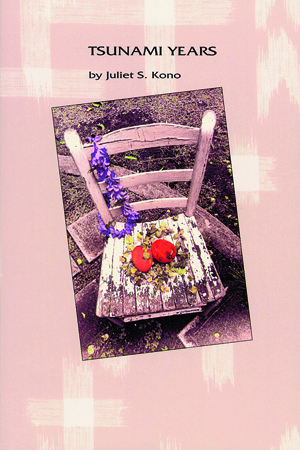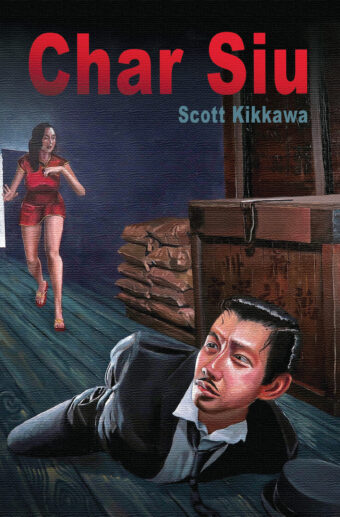Please visit the bookstore!

Winner of the Hawaiʻi Book Publishers Association Ka Palapala Poʻokela Award for Excellence in Literature.
You can read or download Tsunami Years as an eBook or PDF, free of charge, via our BR Digital Archives. Or to purchase a physical copy, visit SPD Books.
Celebrate Women’s History Month with Bamboo Ridge Press as we spotlight two poems by Juliet S. Kono from her second book Tsunami Years.
Kono’s powerful writing captures the experiences of issei and nisei women in Hawaiʻi, but her honest and emotional depictions of life and family make her a literary luminary for women everywhere of any generation.
Tsunami Years packs an unexpectedly hard poetic punch. From the first section, which grips you in the hilariously poignant caring for a mother-in-law with Alzheimer’s Disease, to the ending section where another kind of madness drives a son over the edge, you feel the rush of emotional waves that more than match the real tsunami poems in between. We hope you enjoy these selections and join us in celebrating Juliet S. Kono and other great women in literature.
The Bath
We bathe after all the men.
Women dirty water.
My mother and I walk the long path
on the side of the anthurium grove
to the bathhouse.
Steamy and smoky,
the last embers of firewood
are dying in the copper burner
below the ofuro.
We undress.
Running her fingers
lightly through, she tests the water.
And so what if it burns,
she’s a master of endurance.
Pailsful of scalding water are scooped up
and splashed over her body.
Lathering the towels with Ivory soap,
resting our feet on a duckboard,
we sit on a wooden bench,
our thighs touching.
She turns her back.
I scrub the line of her bones,
the line of small burn scars—
the yaito of her father’s punishment.
“Harder, harder,” she says,
her skin becoming red and shiny.
Moxa wafers and incense fire.
We rinse, climb into the tub
and slowly immerse ourselves.
Water claims our breasts.
It reaches our chins, and we soak,
blood rising to our temples.
The reflection of the bulb
bursts everytime I splash.
Soon, she starts telling me the story, again,
about the tsunami
that destroyed our house.
But I’m not in the mood for listening.
Unlike her, I’m not going
to have to brave men and water;
nothing can ever happen to me.
I catch air in my towel and float it:
here’s an octopus, a jellyfish, a womb.
To muffle her voice,
I take a deep breath
and sink beneath water.
Penmanship
1.
My father had the most beautiful signature.
Driven by compulsion,
he made fast little circles in the air
above the paper with his pencil,
the lead he wet with his tongue.
The motion had the same spin
as the red wind on the cane roads
that picked off hats
and bent the grass seaward.
When his pencil finally touched the paper,
his hand spooled toward the edge
in the force of its own momentum.
They were like waves, curling,
or pipelines.
No. More like coils of wire,
the spirals, the neat ellipses,
he drew between the lines of his notebook
like an architect.
Penmanship.
That’s what he practiced he said,
reliving the round-face boy
slouched over the desk
at the old Ōla‘a plantation school.
2.
A cold wind from the mountains.
Inside, a tea kettle boiled over,
and Mother had rice cake, frying.
I was learning how to write.
After watching me over my shoulders,
my father placed me on his lap—
the only time ever—
held his hand over mine
and guided it across the paper.
Haywire. That’s how tangled
my writing became when he let my hand go.
“Chicken scratch,” he called the scrawls.
I didn’t care. I learned, quickly,
that if I lost control on purpose,
he would take up my hand,
again and again.
3.
Paralyzed, my father
tosses sounds in the back of his throat like a bird
at the sight of my handwriting.
He scratched the air
the time I signed under the unsteady X
of his living will,
the revocable living trust
and durable power of attorney.
Once, as garage manager,
he did it with such flair,
his name authorizing service done on a car.
“Thanks, Asa,” the patrons called out.
“Help me to die easy,” his eyes say.
And I do want to free
him of the pain of his last spin.
But he pulls in like a sea anemone
whenever I touch him.
“It’s chicken scratch, Dad,” I say.
“Here, give me your hand.”
Juliet S. Kono was born and raised in Hilo, Hawaiʻi. She earned a B.A. and M.A. from the University of Hawai‘i at Mānoa. Her first book of poems, Hilo Rains, was published by Bamboo Ridge Press in 1988. She was a winner of the Elliot Cades Award for Literature and the James Clavell Award for fiction in 1991. Juliet Kono and Cathy Song coedited Sister Stew: Fiction and Poetry by Women, published by Bamboo Ridge Press. Now retired, she taught English Composition at Leeward Community College. She lives in Honolulu, Hawaiʻi.
Bamboo Ridge Press is an independent non-profit, tax-exempt corporation and is supported through book sales, subscriptions, private donations, and grants from Hawaiʻi State Foundation on Culture and the Arts and the National Endowment for the Arts, Hawaiʻi Council for Humanities, and others. Your generous contributions and support are welcome and may be tax-deductible.
Monies raised help Bamboo Ridge Press continue its mission to foster the voices of our people through new publishing projects, educational programming and community outreach such as workshops for adults and youth, and free public readings. It will also help to digitize the Bamboo Ridge Press Archive, which will preserve four decades of local literature and provide free and open access to issues that are no longer in print.










Talk story